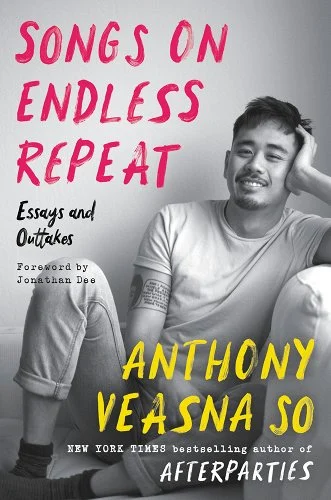[ad_1]
When I teach Anthony Veasna So’s Afterparties, I start with the book’s dedication, which is addressed not to So’s parents or loved ones but to “everyone who underestimated me, including myself.” I also make sure to note the book’s acknowledgements. Like most authors, So spends the bulk of this section generously thanking family, friends, and mentors. Unlike most, he also airs grievances: against the “posturers” he met at Stanford and the “privileged fucks” against whom he competed for a Levinthal Tutorial, for example. It’s a perfect introduction to So’s work because it illustrates the combination of sincerity, comedy, and righteous anger that animated his writing and made his untimely death in 2020 so tragic.
Songs on Endless Repeat displays the same irresistible combination of sensitivity, humor, and anger that defined So’s earlier work, but it also shows him expanding in new directions. More than half of the book consists of a continuous narrative from So’s unfinished novel, Straight Thru Cambotown. Readers will recognize many themes from Afterparties in these pages, including ethnic and generational conflict and struggles with sexual identity.
But Straight Thru Cambotown also has an overarching plot involving a “Circle of Money” in the Cambodian community (basically an illegal Ponzi scheme). When the Circle’s manager dies, one of her “business associates” cryptically informs her nephews and nieces about how to collect their inheritance from the Circle, leaving them to contemplate the intricate network of connections formed by their aunt’s shadow economy. In the foreword, So cites the novels The Last Samurai, One Hundred Years of Solitude, and A Confederacy of Dunces as influences on his style and prose. But I also see The Crying of Lot 49 in the way these chapters use an inheritance mystery to structure the plot but also suggest that attempting to “solve” the mystery might miss the point. In any case, So is in good company when it comes to big, expansive plots.
Songs On Endless Repeat also shows So taking a new approach to the relationship between Cambodian identity and white America. The book’s opening piece is a short fictional vignette titled “We Are All the Same Here, Us Cambos.” It features a garrulous, easygoing narrator like the one found in “Superking Son Scores Again” from Afterparties, a story in which So explored the limited definitions of male success in Cambodian American culture. In “We Are All the Same Here,” the narrator acts like a tour guide, pointing out the racial topography of Cambodian immigrant culture and the difficulty of trying to honor the horror of genocide without being completely defined by it. The story ends with the narrator claiming he’s “sober of all that individualism bullshit” and extending a remarkable invitation to his mainstream American listeners: “We’re with you, have always been so. Let’s be messed-up Cambos together.”
This reversal, whereby the narrator’s Cambodian identity becomes a privileged position from which to see beyond America’s empty promises, resembles moments in James Baldwin or Toni Morrison’s writing when the beauty and intelligence of Black life, shaped as it has been by oppression, becomes something for white America to live up to rather than the reverse. In a recent conversation between the authors Kiese Laymon and Jesmyn Ward, Laymon, a brilliant reader of both Baldwin and Morrison, explained his grandmother’s mistreatment at the hands of the white family for whom she worked not as evidence of the white family’s prejudice but as a sign of their insanity for missing out on what they might have learned from her.
In Songs, So similarly reframes his family’s immigrant experience as something for white America to aspire to. In the essay “Duplex,” for example, So weaves together reflections on his father’s work as a property manager and his time as an art student at Stanford. The essay rehearses a familiar conflict between working-class families and elite institutions of higher education, but rather than leave his childhood behind or even use his academic work to understand it, So makes Stanford answer to his Dad. “I needed to be great, worthy of the Western canon, of Dad,” reads the essay’s first sentence. Towards the end, he imagines resurrecting the ghost of Diane Arbus so that he can show her photos of his father’s properties.
The last essay in Songs, “Baby Yeah,” revisits questions about art and possibility that So previously explored in the story “Human Development,” but it sets a more ambitious task for itself, seeking to understand the value of art in the face of a friend’s suicide. In the essay, So recalls that he and his friend jointly “idolized” the band Pavement because the band’s music expressed their shared desire to connect with a world that withheld empathy. He remembers a particular lazy afternoon when the song “Baby Yeah” arrived randomly on shuffle while they were preparing to teach classes, drawing their attention away from their work. A B-side from the 2002 reissue of Slanted and Enchanted, So writes that the song’s meandering guitar, meaningless lyrics (the words “Baby, baby, baby, yeah” repeated over and over), and abrupt ending “unlocked within us some unbridled, unpretentious, mysterious feeling.”
After his friend’s death, So admits to weeks of unpredictable, grief-inspired behavior before he turned to “Baby Yeah.” Listening to it on repeat for an entire afternoon and night, So lets himself acknowledge his friend’s life and death for the first time, making sense of this experience through Gilles Delueze’s idea that the role of the imagination is to “draw something new from repetition, to draw difference from it.” Concluding his essay, he tries to convince his friend that there were possibilities in the repetitions they experienced together, even if they went unrealized. There were ways of “restructuring the reserves of your spirit,” So writes, and possibly of creating new endings. In this moment, So’s friend’s life, their experience together with Pavement, and now So’s recreation of that experience in language come together in a moving tribute to friendship and art.
Last summer, when Pavement was in the news because there was a joke about them in Barbie (a Ken mansplains them to Barbie after he discovers patriarchy), I thought back to So’s essay and how valuable it was as an addition to conversations about the band. It’s not hard to write Pavement into toxic bro culture. Like David Foster Wallace, Mike Judge and so many other figures from the 90’s indie world, they offer a white, male vision of resistance to corporate America. It’s not a mistake to represent them this way, and Anthony Veasna So’s relationship with Pavement is not valuable because it rescues them or shows us something that Greta Gerwig missed. It’s valuable because it reminds us—more clearly than most—that no work of art belongs inescapably to any culture or any identity. We’re always free to reinterpret or see something differently. To use art to make friendships. Or deal with loss.

NONFICTION
Songs on Endless Repeat
By Anthony Veasna So
Ecco Press
Published December 5th, 2023

[ad_2]
Source link

